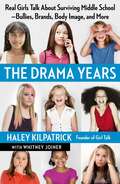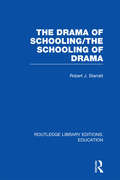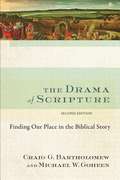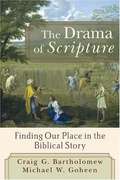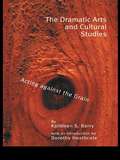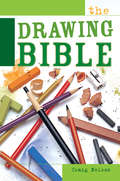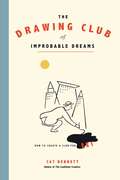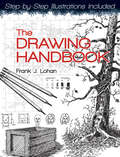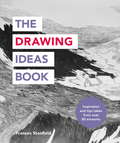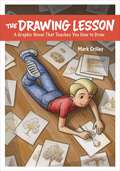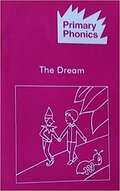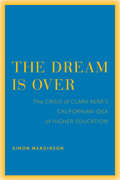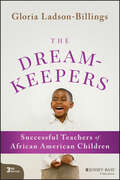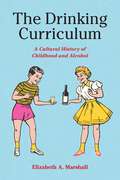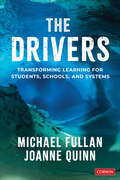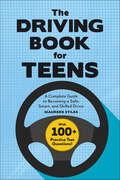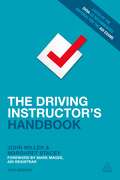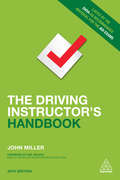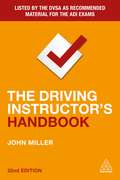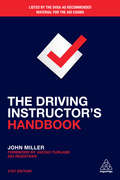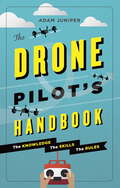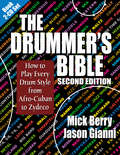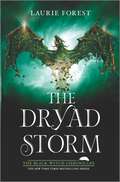- Table View
- List View
The Drama Years: Real Girls Talk About Surviving Middle School -- Bullies, Brands, Body Image, and More
by Haley Kilpatrick Whitney JoinerToday's middle school girls have it rough.In a few short years, they go through an incredible number of biological and emotional changes, making this the most formative--and riskiest--time in their lives. Groups turn on each other, a trusted childhood friend can reveal secrets by sending a text message or updating a Facebook status, and deciding where to sit in the cafeteria can be a daily struggle. As any tween will tell you, life for a middle school girl can be summed up in one word: drama. Haley Kilpatrick's own turbulent middle school experience inspired Girl Talk, a nonprofit organization in which high school mentors offer a "just been there" perspective to tween girls, helping them build self-esteem and develop leadership skills. Here, Haley delivers the definitive guidebook, packed with anecdotes from real girls around the country, who offer their insight into why her friends' approval is suddenly vitally important, why she feels pressured to be perfect, why she's no longer telling her parents everything, and what three vital things adults can offer to the girls in their lives to downplay the drama. Filled with practical strategies from tweens and teen mentors to help adults understand what girls today are facing, The Drama Years is a must-read for anyone struggling to help girls navigate the often difficult transition into adolescence.
The Drama of Schooling: The Schooling of Drama (Routledge Library Editions: Education)
by Robert J StarrattStarratt’s highly original book offers fresh insights into the nature of teaching, learning, schooling as a multi-cultural, social enterprise, and the importance of vision for that leadership—by using the analogy of drama. Schooling is a preparation to participate in the social drama, both as an individual and as a community. Beyond participation, schooling can enable youngsters to maintain and restore the human purposes of the social drama. This unique book accommodates present critics of schools from both the left and the right, but goes beyond them to offer a script for restoring the schools to their human and social purposes.
The Drama of Scripture: Finding Our Place in the Biblical Story (2nd Edition)
by Michael W. Goheen Craig G. BartholomewThe Drama of Scripture is written with first-year university students in mind. It is designed as a text for an introductory course in biblical theology taught at Redeemer University College in Ancaster, Ontario, Canada. The book helps students understand the true nature of Scripture and learn to articulate a thoroughly biblical worldview by systematically developing the most comprehensive categories of the Bible's story line: creation, sin, and redemption. The Drama of Scripture tells the biblical story of redemption as a unified, coherent narrative of God's ongoing work within his kingdom.
The Drama of Scripture: Finding our Place in the Biblical Story
by Michael W. Goheen Craig G. BartholomewThis book tells the biblical story of redemption as a unified, coherent narrative of God's ongoing work within his kingdom.
The Dramatic Arts and Cultural Studies: Educating against the Grain (Critical Education Practice)
by Kathleen S. BerryThis book presents a wide range of contemporary theories borrowed from Cultural Studies augmented with practical implications that support dramatic artists in their struggle to create possible multiple realities for a postmodern future. Teachers, directors, writers, students, and many others involved in the dramatic arts will benefit from the discussions of Cultural Studies and the connections to the Dramatic Arts. The first chapters mix theory and practice while the last chapter provides questioning strategies and conventions that can be used in actual sessions to deconstruct scripted or improvised dramatic texts. This is a useful introductory text for artists, directors, teachers, students, and others involved in the Dramatic Arts who would like to energize their work through contemporary theories and practices of Cultural Studies.
The Drawing Bible
by Craig NelsonThis is your complete guide to drawing--packed with everything you need to know about materials, techniques and drawing styles. Learn the secrets of rendering any subject correctly and creatively in an amazing array of mediums from pencil to full color. Quickly find the answers to common problems and questions so you can get back to the drawing board. The Drawing Bible is a handy, one-stop reference that beginners and experience artists simply can't be without! Learn How To: Master essential line and tone techniques Use proper perspective and proportions Create everything from quick sketches to impressive finished drawings Draw graphite, charcoal, pen and ink, colored pencil, pastel, and more
The Drawing Club of Improbable Dreams: How to Create a Club for Art
by Cat BennettThe Drawing Club of Improbable Dreams shows how to create a drawing club to work with fellow artists to build skills and find our own genius. In the club we make art experiments and the bold mistakes that free us from unnecessary limitations. We also reap the benefit of witnessing how others solve problems. Inside are full instructions on how to start and run a club as well as three 8-week session plans with specific art explorations. The purpose of the explorations we make is not only to build drawing skills but also to build the qualities of curiosity, courage, and critical thinking we need for making art. We will learn how to work from the inside out to make art that is fresh, vital and authentic. The book offers two important rules that will help us be the unique artists we are meant to be. As artists we dream that we might make something fantastic and be fully who we are. We dream that art matters, even that it might change the world. Improbable dreams but, in a club, things start to happen that we didn’t imagine possible. Working together we discover strength we might not have on our own. A club can take us to places we hardly dared to dream of and can show us how improbable dreams are where our hearts are truly meant to be.
The Drawing Handbook (Dover Art Instruction)
by Frank J. LohanDesigned for beginning and amateur artists, this guide to the essentials of drawing features comprehensive, easy-to-follow lessons and more than 500 detailed illustrations. Frank Lohan, a renowned artist and popular instructor, conducts readers through each step of the creative process, from grasping the concepts of perspective and proportion to producing lifelike drawings of a variety of subjects--landscapes, architecture, animals, flowers, and faces. Step-by-step exercises focus on attaining the fundamentals of composition, visualizing the geometry of the subject, working with perspective, and mastering drawing techniques for both pencil and pen and ink. Each exercise includes gridded outline compositions to help students develop their drawing abilities. Suggestions for the selection and use of tools will assist in achieving professional-quality results.
The Drawing Ideas Book
by Frances StanfieldRefresh your creativity and boost your motivation to draw with the expert help of The Drawing Ideas Book.If you're stuck in a rut - or simply just stuck - this book is filled with ideas for what to draw, how to draw and even where and when to draw. Packed with arresting examples of creatives' drawings and sketchbooks from all over the world, it's sure to fire up your creativity.Imagine it, doodle it, sketch it, ink it and more. Discover the infinite possibilities of this essential art form, from its key mediums to unusual processes, across subjects from figure drawing and landscape sketching to abstract compositions.
The Drawing Ideas Book
by Frances StanfieldIf you're stuck in a rut - or simply just stuck - this book is filled with ideas for what to draw, how to draw and even where and when to draw. Packed with arresting examples of creatives' drawings and sketchbooks from all over the world, it's sure to fire up your creativity.Imagine it, doodle it, sketch it, ink it and more. Discover the infinite possibilities of this essential art form, from its key mediums to unusual processes, across subjects from figure drawing and landscape sketching to abstract compositions.
The Drawing Lesson: A Graphic Novel That Teaches You How to Draw
by Mark CrilleyRead This Comic and Start Drawing Today! Nominated for a 2017 Eisner AwardFor the first time ever, drawing instructor and graphic novelist Mark Crilley brings his easy-to-follow artistic instruction to aspiring artists in the form of a comic book, providing you with a one-of-a-kind how-to experience. In The Drawing Lesson, you&’ll meet David—a young boy who wants nothing more than to learn how to draw. Luckily for David, he&’s just met Becky—his helpful drawing mentor. Page by page, Becky teaches David (and you!) about the essential fundamentals that artists need in order to master drawing, all in a unique visual format. In panel after panel, Crilley provides lessons on shading, negative space, creating compositions, and more, with accompanying exercises that you can try for yourself. Are you ready to start your drawing lesson today?
The Dream (Primary Phonics #Set 3 Book 5)
by Barbara MakarA systematic, phonics-based early reading program that includes: the most practice for every skill, decodable readers for every skill, and reinforcement materials--help struggling students succeed in the regular classroom
The Dream Is Over: The Crisis of Clark Kerr's California Idea of Higher Education (The Clark Kerr Lectures On the Role of Higher Education in Society #4)
by Simon MarginsonAt publication date, a free ebook version of this title will be available through Luminos, University of California Press's new open access publishing program. Visit www.luminosoa.org to learn more. TheDreamIsOver tells the extraordinary story of the 1960 Master Plan for Higher Education in California, created by visionary University of California President Clark Kerr and his contemporaries. The Master Plan's equality of opportunity policy brought college within reach of millions of American families for the first time and fashioned the world's leading system of public research universities. The California idea became the leading model for higher education across the world and has had great influence in the rapid growth of universities in China and East Asia. Yet, remarkably, the political conditions supporting the California idea in California itself have evaporated. Universal access is faltering, public tuition is rising, the great research universities face new challenges, and educational participation in California, once the national leader, lags far behind. Can the social values embodied in Kerr's vision be renewed?
The Dreamkeepers: Successful Teachers of African American Children
by Gloria Ladson-BillingsDiscover how to give African American children the education they deserve with this updated new resource In the newly revised Third Edition of The Dreamkeepers: Successful Teachers of African American Children, distinguished professor Dr. Gloria Ladson-Billings delivers an encouraging exploration of the future of education for African American students. She describes eight exemplary teachers, all of whom differ in their personal style and methods, who share an approach to teaching that affirms and strengthens cultural identity. In this mixture of scholarship and storytelling, you’ll learn how to create intellectually rigorous and culturally relevant classrooms that have the power to improve the lives of all children. This important book teaches: What successful teachers do, don’t do, and what we can learn from them Why it’s so important for teachers to work with the unique strengths each student brings to the classroom How to improve educational outcomes for African American children across the country Perfect for teachers, parents, school leaders, and administrators, The Dreamkeepers will also earn a place in the libraries of school boards, professors of education, urban sociologists, and casual readers with an interest in issues of race and education.
The Drinking Curriculum: A Cultural History of Childhood and Alcohol
by Elizabeth MarshallA lively exploration into America’s preoccupation with childhood innocence and its corruptionIn The Drinking Curriculum, Elizabeth Marshall brings the taboo topic of alcohol and childhood into the limelight. Marshall coins the term “the drinking curriculum” to describe how a paradoxical set of cultural lessons about childhood are fueled by adult anxieties and preoccupations. By analyzing popular and widely accessible texts in visual culture—temperance tracts, cartoons, film, advertisements, and public-service announcements—Marshall demonstrates how youth are targets of mixed messages about intoxication. Those messages range from the overtly violent to the humorous, the moralistic to the profane. Offering a critical and, at times, irreverent analysis of dominant protectionist paradigms that sanctify childhood as implicitly innocent, The Drinking Curriculum centers the graphic narratives our culture uses to teach about alcohol, the roots of these pictorial tales in the nineteenth century, and the discursive hangover we nurse into the twenty-first.
The Drivers: Transforming Learning for Students, Schools, and Systems
by Michael Fullan Joanne QuinnBe bold. Think big. Change Schools. Everyday we’re problem solving—but deep down we know the system is no longer working. Do we just keep trying harder, or do we dare to transform how we "do school?" In The Drivers: Transforming Learning for Students, Schools, and Systems, renowned authors Michael Fullan and Joanne Quinn build on their previous books and lay out a complete model for transforming teaching and learning. The goal: making sure students are actually prepared to live and thrive in the complex world around them. Learn to: Orient students, staff, and community around the four drivers: wellbeing and learning, social intelligence, equality investments, systemness Believe that young people can generate more l magic in the world if we enable them Take cues from five school communities who have successfully embarked on system change Lead, develop, and connect with others at different stages of system change Schools are not meant to be solely feeders to MBAs, Ph.Ds, or corporate boardrooms. When we see schools as local hubs of innovation, and model for students what it means to be community-focused, we will renew the relevancy of our most valuable institutions.
The Drivers: Transforming Learning for Students, Schools, and Systems
by Michael Fullan Joanne QuinnBe bold. Think big. Change Schools. Everyday we’re problem solving—but deep down we know the system is no longer working. Do we just keep trying harder, or do we dare to transform how we "do school?" In The Drivers: Transforming Learning for Students, Schools, and Systems, renowned authors Michael Fullan and Joanne Quinn build on their previous books and lay out a complete model for transforming teaching and learning. The goal: making sure students are actually prepared to live and thrive in the complex world around them. Learn to: Orient students, staff, and community around the four drivers: wellbeing and learning, social intelligence, equality investments, systemness Believe that young people can generate more l magic in the world if we enable them Take cues from five school communities who have successfully embarked on system change Lead, develop, and connect with others at different stages of system change Schools are not meant to be solely feeders to MBAs, Ph.Ds, or corporate boardrooms. When we see schools as local hubs of innovation, and model for students what it means to be community-focused, we will renew the relevancy of our most valuable institutions.
The Driving Book for Teens: A Complete Guide to Becoming a Safe, Smart, and Skilled Driver
by Maureen StilesStay safe and smart on the road—a complete driving guide for teens.Learning to drive is an exciting milestone for teens that comes with an amazing sense of freedom and independence—but it's also a big responsibility. Help them be cautious and confident behind the wheel with this ultimate guide to driving for teens.The rules of the road—Make it easy for teens to learn road signs, proper turning and passing etiquette, defensive driving, and more.Acing the test—Teens will find 100 practice questions and an explanation of what their written and driving tests will look like so they can be as prepared as possible.Cars 101—Give your teen an overview on caring for their car—from filling the tank to getting oil changes and knowing what all those lights on the dashboard mean.Safety first—Ensure your teen knows what to do in an emergency or if they are pulled over, how to handle bad weather, and simple ways to avoid distracted driving.If your teen has getting their driver's license on the list for summer activities, pick up this book today and turn them into a savvy driver who's ready for any situation.
The Driving Instructor's Handbook
by John Miller Margaret StaceyNow in its 19th edition, The Driving Instructor's Handbook is widely recognized in the driver training industry as the authoritative reference guide for both trainee and qualified instructors and is listed by the Driver and Vehicle Standards Agency (DVSA) as recommend reading for the Approved Driving Instructor (ADI) exams. This best-selling text covers every aspect of the profession, from the role itself, to the characteristics needed to do the job effectively through the preparation for the three ADI exams (theory and hazard perception, driving ability and instructional ability). It also includes detailed guidance on issues such as licences, training, teaching and coaching skills and road traffic law. This latest edition now also covers practice questions for the ADI part 1 exam, detailed information on driver training, structuring the lesson, dealing with disabilities and impairments and continuing professional development (CPD). The Handbook is essential reading for anyone involved in the training of drivers and instructors at all levels, and will ensure that new drivers are better able to cope with the increasing demands made on them.
The Driving Instructor's Handbook
by John MillerNow in its 20th edition, The Driving Instructor's Handbook is widely recognized in the driver training industry as the authoritative reference guide for both trainee and qualified instructors and is listed by the Driver and Vehicle Standards Agency (DVSA) as recommend reading for the Approved Driving Instructor (ADI) exams. This best-selling text covers every aspect of the profession, from the role itself, to the characteristics needed to do the job effectively through the preparation for the three ADI exams (theory and hazard perception, driving ability and instructional ability). The Driving Instructor's Handbook also includes detailed guidance on issues such as licences, training, teaching and coaching skills and road traffic law and covers all 2016/17 changes to the ADI examinations and standards checks. This handbook is essential reading for anyone involved in the training of drivers and instructors at all levels and will ensure that new drivers are better able to cope with the increasing demands made on them.
The Driving Instructor's Handbook
by John MillerRecognized by the Driver and Vehicle Stands Agency (DVSA) as recommended reading for the Approved Driving Instructor (ADI) exams, this bestselling guide is the authoritative guide for both trainee and qualified driving instructors. The Driving Instructor's Handbook covers every aspect of being a driving instructor, from the role itself, to the characteristics needed to the job effectively, through to preparation for the ADI exams. Now in its 22nd edition, the book includes detailed guidance on issues such as licences, training, teaching and coaching skills and road traffic law. Fully updated to cover all changes including updates to the ADI theory and practical tests, new rules in the Highway Code, revised motorway legislation, different rules and procedures in Northern Ireland and updated advice on disabilities, this book is essential reading for anyone involved in the training of drivers or driving instructors.
The Driving Instructor's Handbook: A Reference And Training Manual
by John MillerNow in its 21st edition, The Driving Instructor's Handbook is widely recognized in the driver training industry as the authoritative reference guide for both trainee and qualified instructors and is listed by the Driver and Vehicle Standards Agency (DVSA) as recommended reading for the Approved Driving Instructor (ADI) exams.This best-selling text covers every aspect of the profession, from the role itself, to the characteristics needed to do the job effectively through the preparation for the three ADI exams (theory and hazard perception, driving ability and instructional ability). The Driving Instructor's Handbook also includes detailed guidance on issues such as licences, training, teaching and coaching skills and road traffic law and covers all 2016/17 changes to the ADI examinations and standards checks, including the most recent essential updates from late 2017. This handbook is essential reading for anyone involved in the training of drivers and instructors at all levels and will ensure that new drivers are better able to cope with the increasing demands made on them.
The Drone Pilot's Handbook
by Adam JuniperThe perfect companion for anyone buying (or thinking of buying) a drone, whether it's just for fun, to race against friends, or to give their to give their photography a whole new angle.The Drone Pilot's Handbook gives you the skills and techniques you need to fly and maintain your multicopter drone, tips for tuning it for maximum performance, and - importantly - a clear graphical guide to where the law will and won't allow you to fly. Meanwhile, spectacular aerial photography from around the world will inspire you to get airborne immediately!Occasional boxouts provide safety tips, handy ideas, and URLs, and flying instructions are presented with attractive original illustrations. This clean approach that makes a welcome contrast to ugly online forums, or the PDFs that drone manufacturers provide, and will have you up and away in no time.
The Drummer's Bible: How to Play Every Drum Style from Afro-Cuban to Zydeco
by Mick Berry Jason GianniUpdated to include 50 additional grooves, this encyclopedic book and two-CD set contains more than 450 musical examples in standard notation, showing grooves and practical variations. Overviews of the history and development of almost all popular music styles are covered alongside innumerable helpful performance tips. The two accompanying CDs feature performances of nearly 200 of the grooves, including every primary style example, all performed both with and without a click track. Styles covered include blues, rock, jazz, reggae, country, klezmer, ska, samba, punk, surf, heavy metal, latin rock, and funk; virtually every style a performing drummer will ever need to play is in there. This revised second edition also includes an updated bibliography and discography, as well as more historical information about the individual styles.
The Dryad Storm
by Laurie ForestThe New York Times bestselling series!Magical forces clash and Erthia hovers on the brink of ruin in the can't-miss finale of Laurie Forest&’s epic fantasy series, The Black Witch Chronicles!Who can survive the Shadow storm? Black Witch of prophecy Elloren Gardner Grey has unleashed her powers and embraced her legacy as a Dryad and guardian of the Forest. But the losses—of life, of love—have been almost too great to withstand as the Shadow continues to devour the world. With only a tattered shred of hope remaining, the Bearers of the Wand of Myth must battle their way back to each other to mount a final stand.But Elloren and her allies are not only facing Mage Vogel's advancing forces—the armies of the Eastern Realm will stop at nothing to see the Black Witch struck down. With Elloren's bonded mate prophesied to kill her, Shadow demons rising, and the ties between allies unraveling, can this fracturing world unite to face down the coming storm?Read all the books in the Black Witch Chronicles! The Black Witch The Iron Flower The Shadow Wand The Demon Tide The Dryad Storm Wandfasted (prequel ebook)* Light Mage (prequel ebook)**Also available in print in The Rebel Mages anthology
